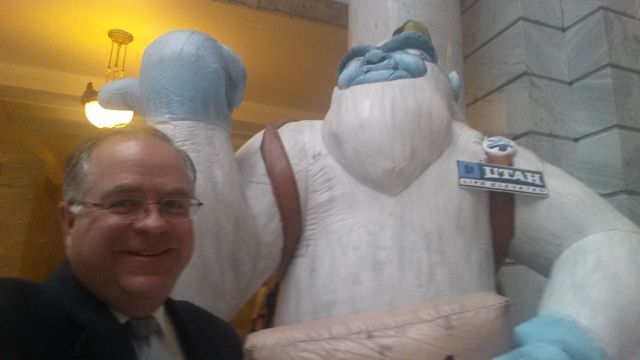
A bill proposed in the Utah State House of Representatives on Monday would update and amend passages in the state's criminal code regarding "offenses committed by means of electronic or computer functions." However, in attempting to address the issue of "doxing"—meaning, publishing personally identifying information on the Internet as a way to harass or attack someone—the bill's language may consequently target free online speech.
Utah HB 255, titled "Cybercrime Amendments," counts State Representative David E. Lifferth as its lead sponsor, and it includes amendments that would penalize denial-of-service attacks and false emergency reports at specific locations (i.e. swatting). Utah state criminal code already punishes certain kinds of electronic communications "with intent to annoy, alarm, intimidate, offend, abuse, threaten, harass, frighten, or disrupt the electronic communications of another," and HB 255 would append that specific passage to count the act of "distributing personal identifying information" as actionable, should that be done with any of the aforementioned intent.
"This bill as drafted is clearly unconstitutional," Electronic Frontier Foundation Staff Attorney Nate Cardozo said to Ars Technica in a phone interview. "There may be anti-doxing legislation out there which does make sense, but this bill creates a crime if you, with the intent to annoy, publish someone else's name. If I want to say [online], 'Sam is a poo-poo head,' that's a crime under this draft."
"It's really trendy, frankly, to legislate in the area of computer crime or cybersecurity right now," Cardozo added. "Because it's trendy to do, we've seen any number of extremely poorly worded and poorly thought-through proposals [from American lawmakers]. This is just another one."
Doxing for good?
The other examples of "electronic communication harassment" that currently exist in Utah's criminal code are phrased in such a way that they clearly define harassing and abusive situations, including repeated contact following a request to not be bothered, threats and other language "likely to provoke a violent or disorderly response," and computer-powered communications with the sole purpose of "disruption, jamming, or overload."
Lifferth's suggested amendment, on the other hand, offers no such specific, harassment-minded qualifiers in regard to "personal identifying information." The legislation as written would punish citizens for posting a laundry list of information about anyone if a court determined there was intent to annoy, alarm, or offend them, including names, birthdays, phone numbers, place of employment, photographs, or other realistic likenesses. The penalty for first-time offenders would be a class B misdemeanor, punishable by up to six months in jail and a maximum $1,000 fine.
Among other things, such legislation might limit citizens' ability to hold public officials and other influential members of society accountable for their actions.
As just one example: in January, an activist exposed a St. Paul, Minnesota policeman's online attempts to incite violence against Black Lives Matter protestors. After the activist connected that officer's name, place of work, photo, and other identifying information to his pseudonymous online posts—which encouraged car drivers to "run [protestors] over"—the department in question suspended Officer Jeff Rothecker. A report from The Washington Post mentions Supreme Court cases in which citizens' rights to identify public figures has been upheld.
In a phone interview with Ars Technica, Lifferth confirmed that he has heard what critics have to say and is revising the doxing-related parts of the bill with their concerns in mind. "The threshold we had in there for cybercrimes might be too low," Lifferth said to Ars. "I am still trying to find the proper thresholds and boundaries for these issues."
He indicated that the words "offend," "annoy," and "frighten" will be removed from the bill's next draft, which is still in committee, but he didn't clarify whether they'd be removed in a way that would impact other existing parts of Utah's criminal code that relied on those terms. Lifferth had no estimate as to when those edits would be available for public review, other than to say "they should be available very soon."
reader comments
64